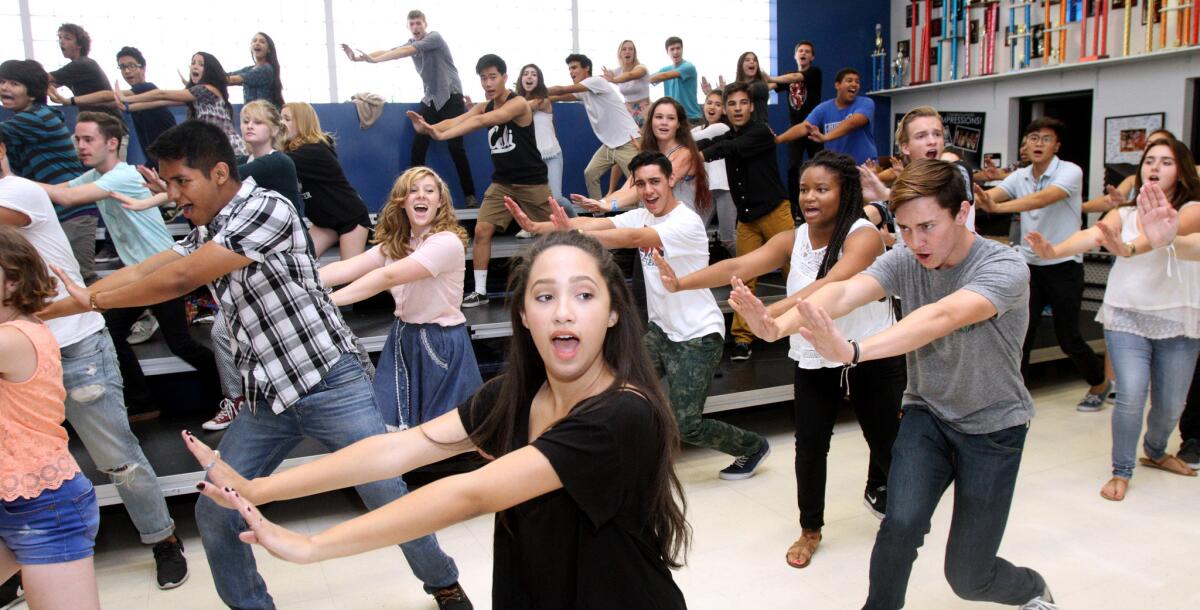Appeals court rules against music-licensing firm suing Burbank High show choir

Last week, the U.S. 9th Circuit Court of Appeals upheld the dismissal of copyright infringement claims brought against the Burbank High School Vocal Music Assn. — made up of five show choirs, one of which inspired the TV series “Glee.”
Tresóna Multimedia LLC, an Arizona-based music-licensing company, claimed that the high school program was using music without properly licensing it or paying for it, according to the lawsuit.
The songs in question, which the choirs used during competitions and fundraisers, included “(I’ve Had) The Time of My Life,” “Hotel California,” “Don’t Phunk With my Heart,” and “Magic.”
Although the songs have multiple songwriters who collectively own the copyright, Tresóna claimed it had rights to the sheet music used to arrange the songs for two show-choir performances.
However, the appeals court ruled on March 24 that the music-licensing firm lacked standing to sue the school over three of the songs. For the fourth song, “Magic,” the court said it is protected by copyright law’s fair-use doctrine.
U.S. Circuit judges Kim McLane Wardlaw and Andrew D. Hurwitz and U.S. District Judge Edward R. Korman sat on the panel for the Ninth Circuit.
“We are especially swayed here by the limited and transformative nature of the use and the [arranged show music’s] nonprofit educational purposes in enhancing the educational experience of high school students,” Judge Wardlaw wrote in an opinion document.
In the lawsuit, Tresóna named the high school program, its music director Brett Carroll and individual parents involved in the choirs’ boosters club as defendants. The appeals court reversed the previous district court’s decision regarding attorney’s fees, which the Burbank defendant group will now not have to pay.
Attorney A. Eric Bjorgum, who represented the boosters club, said, “One thing that is amazing about this case is that they not only sued the nonprofit [boosters club], but also sued the parents and their spouses who work with the [nonprofit]. You have people that are just helping their kids and all of a sudden, they’re on the hook for a federal copyright lawsuit.”
The club holds several fundraisers to cover the show choirs’ expenses for costume rentals, competition entry fees, transportation, choreographers and professional music arrangers.
Bjorgum also said the case is the first major decision applying a fair-use defense, changing how schools deal with license requests.
“All these schools, at least in this part of the country and hopefully all over the U.S., will now not have to pay the license fees if they change the songs enough and continue to use them for noncommercial educational purposes,” he said.
Jann-Michael Greenburg, Tresóna’s vice president of business affairs, stated via email that the firm believes songwriters’ rights are important, and the company is “working with our counsel to determine the appropriate way forward, including by filing an appeal, if proper.”
He added, “The Burbank High School Vocal Music Assn. ... raises and spends hundreds of thousands of dollars each year paying for flights, hotels, competition fees, equipment, supplies, arrangers, musicians, choreographers and many others. The only people that are not asked permission or compensated for the use of their property are the songwriters whose music forms the basis of all of the association’s activities.”
The litigation began in 2016 and U.S. District Court Judge Stephen Wilson sided with the high school choir, explaining that Tresóna does not exclusively own the rights to the songs.
He also ruled that Carroll was immune from the lawsuit as a public employee and that his actions were reasonable.
After Tresóna lost the lawsuit, Mark Greenburg, president of the music-licensing firm, filed a complaint with Burbank Unified and the U.S. Department of Education’s Office of Civil Rights against Carroll.
He asked school officials to review text messages between Carroll and a music arranger that Greenburg described as inappropriate communications. Greenburg said the private text messages were obtained through Carroll’s attorney as legal discovery in the copyright case.
Following the complaint, the school district placed Carroll on paid administrative leave in January 2017. Carroll later resumed his position as a teacher and show choir director.
Citing personnel matters, Burbank Supt. Matt Hill declined to provide specifics about the situation and the exact date of Carroll’s return.
Carroll also declined to speak about the litigation.
